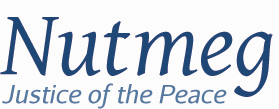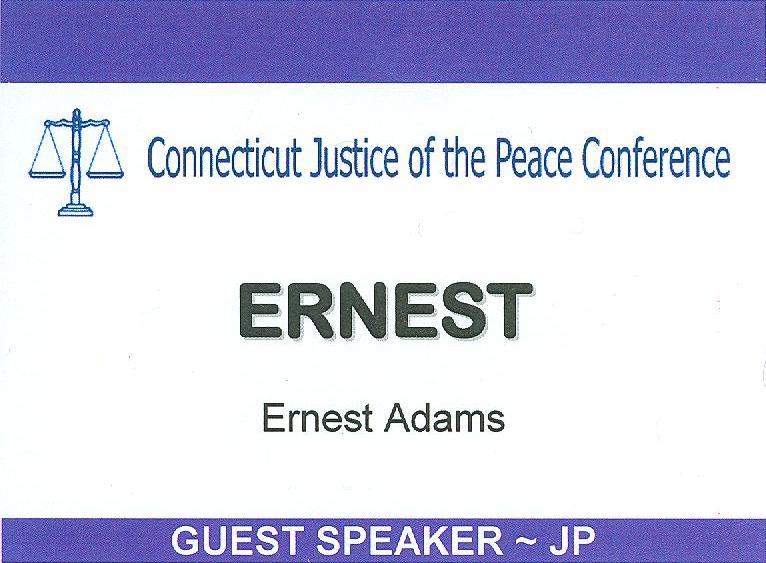
Suggested Criteria for Selecting Your Wedding Officiant
Connecticut Justice of the Peace
Ernest Adams — (860) 543-2334
Celebrating Your Day Your Way!
You must choose a wedding officiant who is legally authorized to perform weddings in Connecticut.
Your officiant should be available to you when you need help or advice.
You and your officiant should plan your ceremony together, according to your desires.
- Be sure that the person you speak to on the telephone or via email is actually the person who will be performing your ceremony.
- Some web-based "officiants" are in fact just referral agencies that seek a fee from truly local officiants to receive a referral.
- There is one person who is infamous for quoting above market price, then claiming it is the local person's fee.
- Ask any potential officiant if they are a referral group or in fact an officiant in the city or town where you want to be married.
- Try to select an officiant actually authorized and performing ceremonies in your area, not a referral group who charges referral fees.
- The person you choose to be your wedding officiant is going to be sharing a very personal, very important moment in your life.
- Will you be treated with dignity and respect?
- Is your officiant going to follow your wishes, or are there rigid rules that you must follow?
- Flexibility should be one of the benefits of having a Justice of the Peace as your officiant!
- Will you have a one-size-fits-all, cookie-cutter ceremony?
- Is your officiant going to spend the time to get to know you and create a unique ceremony just for you?
- Your ceremony should reflect your tastes, senses of humor, and values.
- That is why I prefer to meet with you for a planning session early in our process. There is never a fee for the initial meeting!
- Will your officiant encourage other people to take part in your ceremony?
- You might want to have family members or friends read a poem or sing a song.
- There should be many options for involving other people, including children, in your celebration.
- Your officiant should be proactive in helping you decide whether to actively include friends and family.
- Beware of the officiant who insists on doing everything!
- Does your officiant have rules for photographers, videographers, musicians, and other wedding professionals?
- Some officiants will not permit photos of the ceremony.
- Some other officiants say "No flash photography."
- I have rules only for me. The prime rule: It's your wedding. I'm there to help in every way possible.
- You, your family, your friends, and your descendents, will all want to see pictures of your wedding.
- If you photographer wants to get a close-up of you exchanging rings, it's my job to step aside so the photographer gets the best shot.
- Whether you hire a wedding planner or not is up to you. If you have a planner or consultant, I will be happy to work with them.
- If you have a DJ or live musicians, I usually meet with them briefly so that they know what we're going to be doing and in what order. Then I work with them.
- The people that you hire are professionals, just as I am, and deserve to be treated as such.
- Will your officiant travel to the location that you want?
- Connecticut Justices of the Peace are permitted to marry people anywhere in Connecticut.
- Some Justices of the Peace do not want to travel out of their own town.
- Being a Mobile Justice of the Peace, I am happy to go anywhere I'm needed.
- Does your officiant require you to take classes?
- Some officiants want you to take classes with them before they are willing to marry you.
- Often these "classes" are a way of promoting the officiant's religious point of view, or simply to receive additional fees.
- Other officiants may want you to join their church before they will marry you.
- Your religious choices are yours. Don't be blackmailed. Freedom of religion means any religion or no religion!
- If your officiant condemns you for things that you have done in your past, or are doing now, walk away quickly.
- You have made the decision to marry. That should be the sole criterion for your officiant accepting you.
- I will not ask you if you're pregnant, are living together, or any similar question. It has no bearing on my happiness in marrying you.
- What, if any, religious expression do you want in your ceremony?
- You should feel comfortable that your officiant will honor the traditions that you want to include.
- This is especially important if you follow two different traditions, and you would like elements of both included.
- Many couples these days are describing themselves as "Spiritual, but not religious."
- Your ceremony can easily be written with or without mention of God or a higher power.
- Where does the officiant's power to marry you come from?
- My authority comes from the State of Connecticut.
Please see "Who can perform marriages in Connecticut?" on the
Wedding Questions Page.
- Some officiants will say that theirs comes from God.
- My personal belief system does not enter into it.
- (But if you truly would like to talk about theology, I will be happy to! It won't have any impact on your wedding day, however.)
- Just a word of warning: Connecticut has cracked down on so-called "Internet ordinations".
- Some other states allow people to get "ordained" by a Web Site just to marry friends.
- Connecticut law requires clergy to have an active ministry in addition to marrying people.
- If you have a ceremony with an "Internet minster" you will not be legally married
- Does your wedding officiant keep up to date with changes in Connecticut's marriage laws?
- For example, effective on October 1, 2009 Connecticut requires you to get your marriage license in the town where you will have your ceremony.
- Keeping up with the law, as well as changing wedding styles and new ideas for wedding ceremonies, is important to me.
- As well as talking with Town Clerks every week, I belong to several associations for Justices of the Peace and other wedding officiants.

- It was an honor to be invited to make a presentation at a recent Connecticut Justices of the Peace Conference!
- Another CT Justice of the Peace wrote on FaceBook "He taught fellow JPs so much yesterday about how to enhance a ceremony.
Ernest reminds me of the Randy Bartlett [a great DJ] of the JP World. By giving attention to just little staging details about rings,
handfasting, [and] positioning, he took an ordinary, but good, [example] ceremony and made it [...] better!
For JPs who missed the conference yesterday - sorry for you, really - Ernest was GREAT!
And for people looking to get married, if I am not available I would call Ernest next!"
- Thank you, Bettie-Jeanne, for the high praise! Bettie-Jeanne does only a few ceremonies a year, and gets high praise from all her wedding couples.
I recommend her highly.
- Does your officiant have experience in public speaking?
- For some people speaking in public seems to come naturally. Other people never get over being nervous.
- Because of my background in teaching and my training as a speaker, large gatherings do not intimidate me.
- Will your officiant conduct your rehearsal? Will you need one?
- When we meet to plan your ceremony, we will decide together whether you need to have a rehearsal or not.
- If we decide that a rehearsal is needed, I will conduct the rehearsal. That's part of my job, making your wedding day go smoothly!
- Are "Wedding Presider" and "Justice of the Peace" the same thing?
- A Justice of the Peace or other legally-authorized officiant could preside at a Connecticut wedding.
- Some people call any person presiding at a wedding in Connecticut a presider, and wedding presider can refer to someone who presides at either a religious wedding or a civil wedding.
- Because "presider" usually means someone acting as chairman, moderator, or president to run a meeting, "Wedding Officiant" is usually considered the better term; please see below.
- Are "Officiant", "Officiate", "Officiator", "Officicant", and "Wedding Minister" all the same thing? How about an "Internet Officiant"?
- "Wedding Officiant" is, by far, the preferred term.
- You may see the term "Wedding officiate" on the Web.
"Officiate" is a verb; "officiant" is a noun. A wedding officiant will officiate at a wedding ceremony.
- Some places still list the term "Wedding Officiator". While not wrong, it is considered obsolete.
- "Wedding Officiant" is the most-used term for a person authorized to officiate at weddings in the United States.
- In Connecticut, there is no such thing as a "Wedding Minister" or "Internet Officiant"!
- Only ordained or licensed people who have an active Connecticut ministry performing religious duties other than marrying people can legally marry people in Connecticut.
- Ministers, priests, rabbis, and other religious leaders who lead established Connecticut congregations that meet regularly are legally authorized to perform marriages.
- An "Internet ordination" is not valid in Connecticut.
Copyright © 2010, 2011 Ernest Adams All rights reserved.
Version 4.4 24 January 2011

